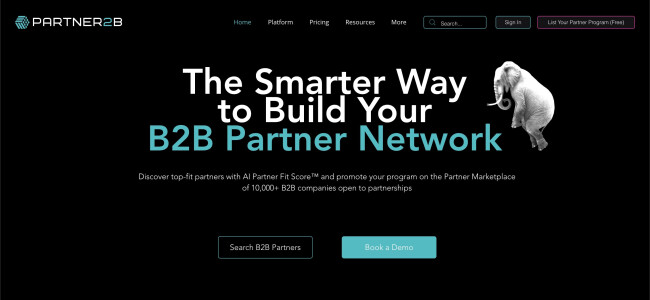
In today’s rapidly evolving business landscape, companies are increasingly turning to technology to gain a competitive advantage. One of the most transformative technologies at their disposal is Artificial Intelligence (AI). More specifically, the emergence of AI B2B Partner solutions is paving the way for businesses to optimize their operations, enhance partner relationships, and drive growth. This article will explore the multifaceted benefits of AI in B2B partnerships, strategies for implementation, and real-world success stories.
The Rise of AI in B2B Partnerships
The adoption of AI tools in B2B settings is no longer a futuristic concept; it’s a present-day reality. Businesses are leveraging AI for various purposes, including data analysis, customer service, and supply chain management. The integration of AI facilitates more informed decision-making, faster responses to market changes, and improved efficiency. As regulatory environments and consumer expectations evolve, businesses that harness the power of AI are better equipped to adapt and thrive.
Enhancing Efficiency with AI
One of the most significant advantages of employing AI in B2B partnerships is enhanced efficiency. AI algorithms can analyze massive datasets far more quickly than humans, identifying trends and insights that might otherwise go unnoticed. This capability allows businesses to optimize their operations by streamlining workflows and automating tedious tasks. For instance, machine learning models can predict inventory needs, allowing companies to manage stock levels effectively and reducing both excess and shortages.
Automated Customer Interactions
Automated chatbots and virtual assistants powered by AI have revolutionized the way businesses interact with their partners and customers. These tools can handle customer inquiries around the clock, providing instant responses and freeing up human employees to focus on more complex issues. This not only enhances the partner experience but also ensures that critical queries are addressed promptly, fostering a sense of reliability between partners.
Predictive Analytics
Predictive analytics is another area where AI significantly impacts B2B partnerships. By analyzing historical data and identifying patterns, predictive models can forecast future trends, helping businesses make strategic decisions. For example, a company can use predictive analytics to anticipate market shifts, understand customer needs, and tailor their marketing strategies accordingly. This data-driven approach enhances collaboration between partners, as strategies can be aligned based on mutual forecasts and insights.
Personalization in B2B Relationships
Personalization is often associated with B2C interactions, but it is equally important in B2B relationships. AI enables businesses to deliver personalized experiences to their partners by analyzing all available data to understand precisely what each partner values. This approach fosters stronger relationships, as business partners feel understood and appreciated.
Customized Solutions

AI can facilitate the creation of tailored solutions for partners by analyzing their specific business needs, goals, and challenges. For instance, AI-driven analytics can help a manufacturer identify particular product features that a specific client values, allowing them to customize their offerings. This level of personalization can strengthen partnerships and differentiate a business from its competitors.
Case Studies: Successful AI Integration
To illustrate the transformative potential of AI in B2B contexts, let’s explore a few case studies of businesses that have successfully integrated AI into their operations.
Case Study 1: Supply Chain Optimization
A leading retail company faced significant challenges in managing its supply chain due to fluctuating demand and inefficient inventory management. By implementing an AI-driven analytics platform, the company was able to predict consumer buying patterns and adjust its order quantities accordingly. As a result, the company reduced its holding costs by 30% and improved product availability, leading to increased customer satisfaction and sales.
Case Study 2: Enhancing Sales Strategies
A B2B software firm utilized AI to analyze customer interactions and sales data to identify high-value leads. By implementing a predictive lead scoring system, the sales team could focus their efforts on prospects with the highest likelihood of conversion. This strategic alignment not only increased overall sales but also reduced the sales cycle time by 25%, enabling the company to close deals more efficiently.
Challenges and Considerations
While the benefits of AI B2B partnerships are substantial, there are challenges that businesses must navigate. Data privacy and security concerns are paramount, as companies are required to handle sensitive information responsibly. Implementing AI solutions also necessitates a cultural shift within organizations, as employees may need training to adapt to new technologies. Furthermore, there is a need for robust infrastructure to support AI tools effectively.
The Future of AI in B2B Partnerships
Looking ahead, the role of AI in B2B partnerships is poised to expand. As technologies advance, AI solutions will become more sophisticated, enabling deeper insights and more nuanced partner interactions. Businesses that invest in AI now will position themselves at the forefront of their industries, ready to capitalize on emerging opportunities and navigate potential challenges effectively.
Conclusion
In conclusion, AI B2B Partner solutions represent a significant opportunity for businesses to enhance efficiency, foster deeper partnerships, and drive growth. By embracing AI, companies can tailor their strategies to meet the needs of their partners, streamline operations, and make data-driven decisions. As the landscape continues to evolve, those who leverage the power of AI will undoubtedly lead the charge in shaping the future of B2B business.



Leave a Reply
Want to join the discussion?Feel free to contribute!